The Unsung Hero of the British Office
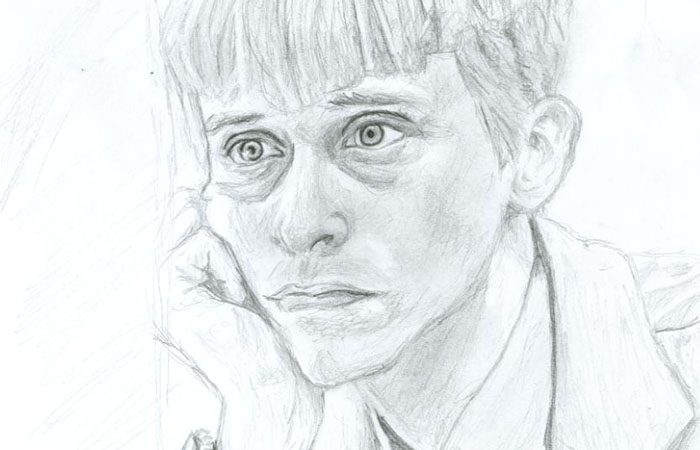
The Office, in its original British incarnation, is a wildly-popular mockumentary sitcom created by Ricky Gervais and Stephen Merchant. This series follows the hilarious misadventures of workers at a paper company called Wernham-Hogg, whose office is located in the city of Slough. The series has four main characters, of whom the best known are Gervais’ own David Brent, a stupid and unprofessional middle manager; as well as audience favorite Tim Canterbury. Upon closer inspection, however, the true hero of the British Office is not David at all, or even Tim, but rather the Assistant (to the) Regional Manager, Gareth Keenan. Of the four leading roles, Gareth is the one who most resembles a traditional hero. Ironically enough, he is also the least likely to receive credit for his development as a person or his contributions to the narrative, either in or out of universe.
The Office and the Hero’s Journey
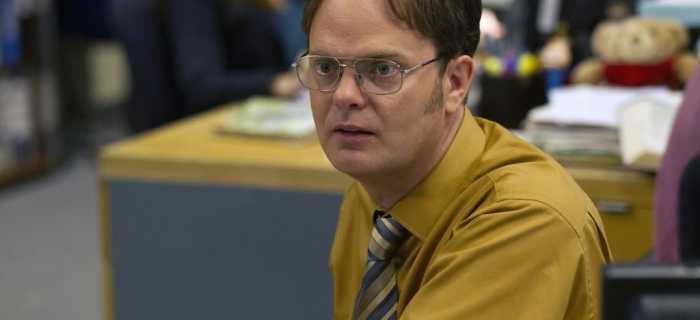
One school of thought that has gained some traction among fans of the US Office is that Dwight Schrute, who is based on Gareth, is the true hero of the series. There is even a YouTube video, by a user named 10K Bill, that elucidates Dwight’s character arc in light of something called the Hero’s Journey. According to 10K Bill, Dwight’s journey concludes once “he’s learned the value in friendship with his coworkers and how to be a competent manager 1.” Thus, one would expect to see Gareth’s arc conclude in a similar way.
The Hero’s Journey is a narrative structure identified by a writer named Joseph Campbell. Campbell meticulously catalogued a series of eighteen steps or events, each representing a different facet of personal growth, drawn from myth and legend, which he collectively dubbed the Monomyth 2. However, 10K Bill’s video references a more up-to-date version of the Hero’s Journey based on the writings of Christopher Vogler. Vogler had studied Campbell’s Monomyth in college. Later, as a Disney employee, he updated the Monomyth to make it more friendly to the company’s screenwriters 3. Since Vogler’s Hero’s Journey was specifically geared toward writing heroic characters for film and TV, it is of limited use for analyzing a series like the original British Office, which was never meant to be a heroic story in any way. As such, the rest of this article will focus on Campbell’s version of things.
Whilst the idea of Dwight being a hero despite his considerable flaws continues to gain traction, the idea of Gareth as a hero is almost totally unexplored. On the surface he doesn’t seem to possess any of Dwight’s charisma or his more noble and admirable qualities. Even the actor who plays him, Mackenzie Crook, has said that he is a terrible person 4!
The problem with this view is that the way the series treats Gareth is completely different than what one would expect if he were really meant to be such an unlikable antagonist. It’s notable that he is the only main character who attains a happy ending in the series’ original run; David, Tim, and Dawn all have to wait for the Christmas special for their chances at happiness. Gareth is also the character who grows the most as a person over the course of the series. Dawn and David show almost no development at all until the very end, and although Tim does grow and develop in a very limited way, only Gareth is a noticeably different person at the end of the series than he is at the beginning. In other words, he is the one who behaves the most like a typical protagonist.
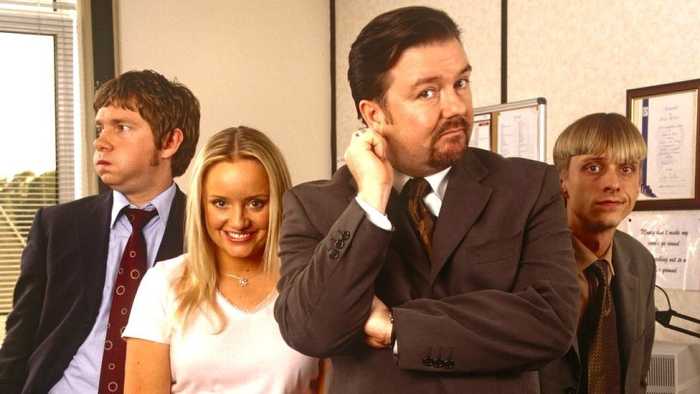
Seen from Gareth’s perspective, The Office becomes a sort of coming-of-age story in the vein of Joseph Campbell’s Monomyth. Although the Monomyth is usually associated with ancient legends and high fantasy, Campbell himself was most interested in the psychological implications of it, and his book contains numerous references to Freud and other psychoanalysts. Campbell argued that everyone’s life could take the shape of an epic legend–even, presumably, that of a paper salesman in a drab post-industrial English city. Campbell’s Monomyth has more steps than Vogler’s Hero’s Journey, but is essentially divided into three main stages: the “separation,” the “initiation,” and the “return 5.” In The Office, these stages roughly correspond to Series One, Series Two, and the Christmas special, respectively.
Gareth’s Ordinary World
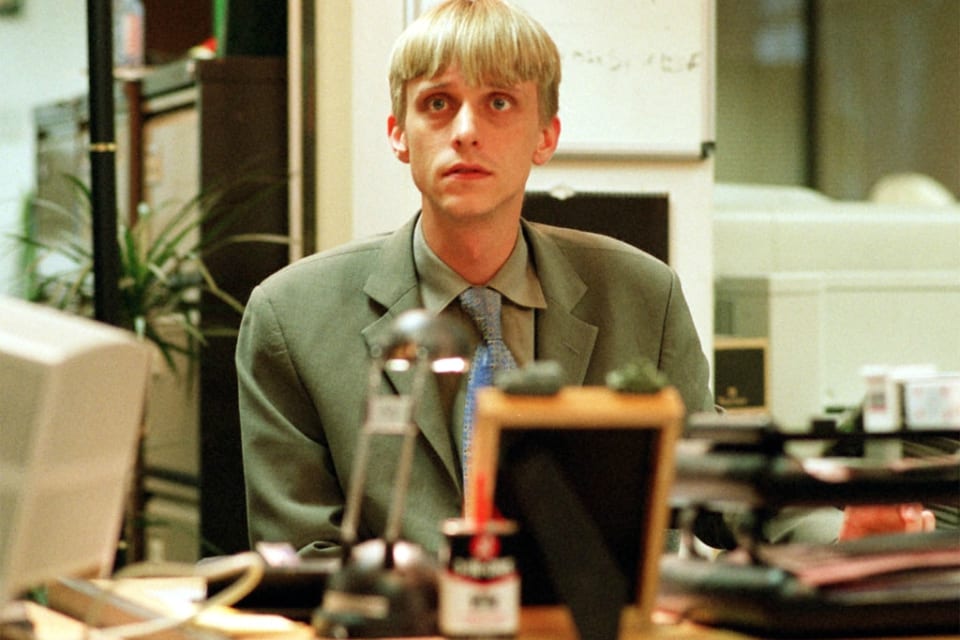
Both Campbell and Vogler begin the Hero’s Journey in the same place: with the hero in his ordinary world. At this time the hero of the story largely sees himself as a regular person living a normal life, although he may have experienced a special birth or childhood. Gareth’s ordinary world is very similar to Dwight’s, insofar as he is a salesman working at a paper company in a boring post-industrial town. He is twenty-nine years old at the start of the series, and his constant companions in this world are his boss, David Brent, and fellow salesman Tim Canterbury. Gareth deeply dislikes Tim for his tendency to play mean-spirited pranks. At the same time, he genuinely respects and looks up to David, even though David does not respect or value him in return.
The most famous of Tim’s pranks, and one of the most famous scenes in the entire series, entails putting Gareth’s stapler in a molded jelly dessert. This scene is instructive in a number of ways. Most people who watch The Office assume that Tim is meant to be a lovable underdog, but the way the jelly prank plays out suggest otherwise. At first David, taking his cues from Gareth, advises Tim half-heartedly to stop putting Gareth’s belongings in jelly. When Tim makes a pun about the jelly, however (“Gareth, it’s only a trifling matter”), both David and Ricky, the temporary worker, immediately try to come up with dessert jokes that they can use to make fun of Gareth as well. Viewers can clearly see the three of them–Tim, David, and Ricky–arrayed against the lone Gareth, whose concerns about “damage to company property” fall on deaf ears.
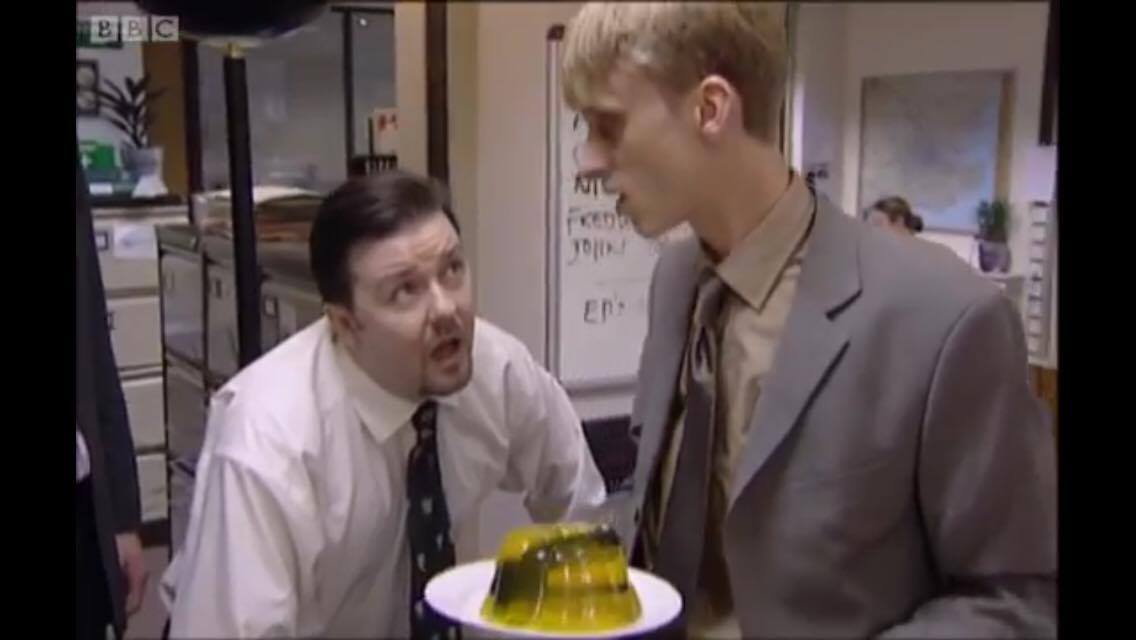
A deleted scene cut from the end of Episode One further clinches the point. In this scene, David calls Tim and Gareth into his office and attempts–in his usual clumsy way–to get them to come to an understanding. After they take their seats in the office the first thing David does is turn to Tim and ask him to tell David what annoys him about Gareth. Tim wastes no time in getting to the point:
Tim: He’s anal-retentive, he’s smelly, he thinks he’s a soldier, he’s obsessed with the idea of surviving in a post-holocaust world–
Gareth: I’m not obsessed with anything.
Tim: You are obsessed with it because you’re always going on about it.
Gareth: Just ’cause I know how to survive in a situation like that, where will you be? I’ll be laughing, it’ll be me and the cockroaches. Where will you be?
Tim: You and the cock–? Well, fine, you are a cockroach so you’ll enjoy that. He thinks the sun shines out of–
Gareth: Well you’re a cockroach.
6
The scene eventually cuts to a later point; most likely, Gareth has to sit and listen to Tim roasting him for several minutes at least! David then presents both Gareth and Tim with contracts he drew up for them to sign, in the hopes of convincing them to respect each other. Gareth’s contract has three items whereas Tim’s has only two. Thus, even the contracts David comes up with to keep the peace exact a higher price from Gareth than from Tim. If anyone is truly the underdog in the Slough branch of Wernham-Hogg, it’s Gareth, not Tim.
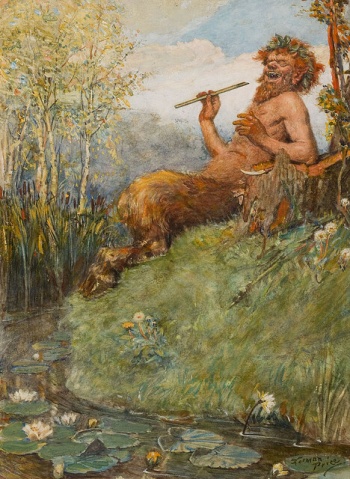
However, to call Tim a villain, as some have done 7, would be a mistake. What he really seems to be is a version of the Jungian Trickster Archetype. Tricksters are a common feature of myths the world over, and usually have a split personality, sometimes blocking the heroes from their quest and sometimes helping them 8. Tim behaves in much the same way towards Gareth. Although he often tricks and annoys Gareth, sometimes going so far as to bully him, there are numerous moments, particularly in the second series, in which he acts as Gareth’s unwitting ally, giving him advice or keeping him from getting into even deeper trouble than he already has.
Virtuous Gareth
At first glance Gareth might not seem as though he has any virtues at all, especially in the early stages of the story. Yet, even at the very beginning, he does have some admirable traits. In fact, he may be the only regular character in the series who bothers to keep a value system–albeit imperfectly–rather than taking all his cues about how to behave from his peers and surrounding environment. This is yet another trait he shares in common with Dwight, but the exact things Gareth values are somewhat different.
The first of Gareth’s significant virtues is his modesty and lack of pride. He does have certain things that he is arrogant about, but the overall sense of superiority exhibited by the likes of Dwight and David is just not there. When Gareth hears that there is going to be downsizing at Wernham-Hogg, he states that he knew that this day would come because “that’s just natural selection.” In particular, he singles out a forklift operator in the warehouse, whose disability Gareth assumes will prevent him from performing his job safely. Yet, even here, Gareth is careful to qualify his remarks by saying: “Anton’s a lovely bloke, don’t get me wrong. But, should be be working there?”
By contrast, this is how Dwight reacts to the news that there is going to be downsizing at Dunder-Mifflin:
Downsizing? I have no problem with that. I’ve been recommending downsizing since I first got here. I even brought it up in my interview. I say, bring it on.
9
Gareth also rarely brags about his achievements in general, preferring instead to let them speak for themselves. For instance, it isn’t until the fifth episode of the first series that David reveals that he has never missed a day of work due to illness. Along similar lines, although Gareth name-drops the Army Reserve quite frequently, it is only in the sixth episode that he reveals that he is a commissioned officer and not just a run-of-the-mill soldier, and only because David asks him what his rank is. What makes this all the more remarkable is that Gareth is surrounded by narcissistic people who are constantly angling for the spotlight, and yet he never feels the need to copy their strategies to steal it for himself.
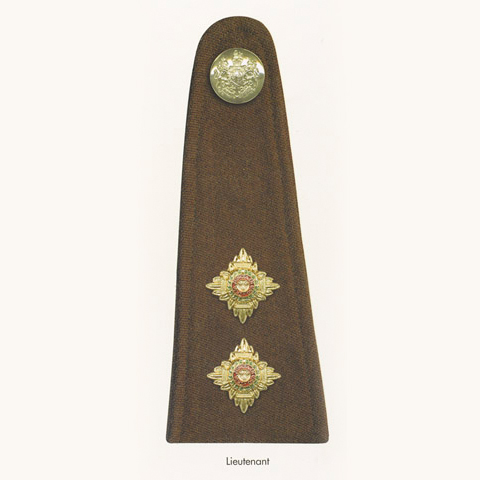
Yet, none of this is to suggest that Gareth is passive, or lacks confidence. He sets high standards for himself in the workplace which he strives to meet, and there’s some evidence he’s responsible for bringing in most of the branch’s money. He also has no problem talking back to David whenever he thinks the situation warrants it, even though David is his boss. For instance, when he discovers that Tim has put his stapler in jelly, he orders David to give Tim an official warning (which David ignores). By contrast, David, who is a lot more vain and conceited than Gareth, comes across as less confident than him in many ways. He repeatedly demonstrates throughout the series that he cares so much about other people’s opinions of him that he can’t be trusted to stick to his principles (such as they are).
Another important trait Gareth possesses, even in the earliest stages of the story, is a commitment to justice and fairness. C.S. Lewis defined “justice” as “includ[ing] honesty, give and take, truthfulness, keeping promises, and all that side of life 10.” Likewise, although Gareth sometimes bends the rules in pursuit of the things he wants, or forgets them in moments of passion, in general he tries to be scrupulously fair in his dealings with others.
The first clue to this appears in the second episode, when Gareth is conducting his investigation. As he interviews Tim and Dawn, he argues that the investigation gives him special authority, a point that Tim and Dawn dispute. All the same, Gareth admits that he has no intention of firing them, even if he could. Most likely, Gareth realizes that, as annoying as Tim and Dawn are, their behavior does not constitute a fireable offence, and he intends to respect that. It is instructive, again, to compare this to Dwight, who spends large stretches of the US Office trying to get his rival, Jim, fired because he finds him annoying.
A clearer example of Gareth’s love of fairness can be seen during Wernham-Hogg’s annual quiz night, for which Gareth is the quizmaster. Eventually, the quiz comes to a tie between David and Chris Finch, on the one hand, and Tim and Ricky on the other. When Ricky answers the tie-breaker question correctly, Gareth gives his team the win–and the bottle of champagne–even though he does not like Tim or Ricky and knows that David and Chris Finch are very sore losers.
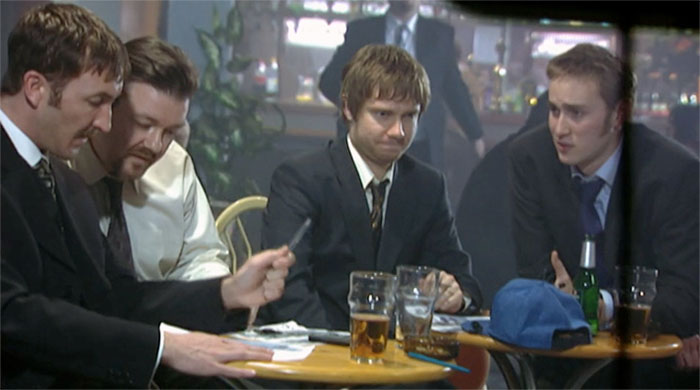
Even Gareth’s close ties to David do not, as commonly thought, stem just or even primarily from a desire to kiss up to him in order to gain power and influence. Instead, it’s quite likely that he owes David a genuine debt of gratitude. It’s implied numerous times throughout the series that David tries to look generous and benevolent by hiring people who seem to have nowhere else to go, whether they turn out to be good workers or not. This approach comes with numerous problems, but it was very good for Gareth, who might otherwise have never secured a white-collar job. Gareth is, by all appearances, a man from a working-class or low-income community, who has no university education or background in business or sales. Under normal circumstances, someone like him would be working in a factory or warehouse, where opportunities for advancement would be a lot more limited and opportunities to get rich virtually nonexistent. Instead, David took him under his wing and gave him a job that he has been very successful in, and that comes with real opportunities to climb the social and economic ladder. In light of all this, it’s really not surprising that Gareth feels attached to David, even to the point of putting up with a certain amount of abuse from him.
The Call to Adventure and the First Quest

The Hero’s Journey kicks off with a Call to Adventure, which Campbell, in his usual poetic style, describes thusly:
[W]hether small or great, and no matter what the stage or grade of life, the call rings up the curtain, always, on a mystery of transfiguration–a rite, or moment, of spiritual passage, which, when complete, amounts to a dying and a birth. The familiar life horizon has been outgrown; the old concepts, ideals, and emotional patterns no longer fit; the time for the passing of a threshold is at hand.
[…]
Thereafter, even though the hero returns for a while to his familiar occupations, they may be found unfruitful. A series of signs of increasing force will then become visible, until […] the summons can no longer be denied.
11
In The Office, Gareth’s call to adventure begins when David calls a meeting to discuss the plans to downsize Wernham-Hogg’s Slough and Swindon branches. Earlier in the episode, David’s boss, Jennifer Taylor-Clarke, met with David and Dawn and explained that the company planned to close either the Slough or Swindon branch and incorporate it into the other. The workers of whichever branch closes will either be laid off or forced to relocate to the other branch. At the staff meeting, David tries to reassure everyone that their jobs are safe, even promising them that there will be no redundancies, but nobody is especially convinced.
At the time, Gareth is unconcerned about layoffs because he knows he works hard and contributes to the company. However, the meeting still deals him a couple of low blows. For one thing, he learns that Dawn was allowed into the meeting with Jennifer and he was not, which serves as the first real indication that he might not be David’s special favorite after all. Secondly, at the end of the meeting he asks the staff to raise their hands if they trust him. All of them ignore him, though, except for Sheila, a woman who works in the accounting department. When she raises her hand, David tells her rather dismissively to “Put your hand down!”
Gareth’s first real quest takes place in the next episode, when David discovers that a pornographic picture of him has been circulated on the company’s computers and taps Gareth to track down the culprit. This is the first time David asks Gareth to do anything not directly related to work, and he even equips Gareth with a spare room he can use as his very own office, which Gareth will return to many times in future episodes.
Although on the face of it this mission might seem totally unrelated to the company’s downsizing, there actually is a connection between these events. It provides Gareth with a chance to prove himself and win David’s admiration, and–depending on who the perpetrator is–may also provide David with someone he can fire. Since the company has to make cutbacks anyway, any sort of misstep can jeopardize an employee’s standing and, by extension, their job. David acknowledges as much in the very first episode, when he jokingly threatens to fire Dawn for allegedly stealing Post-It notes.
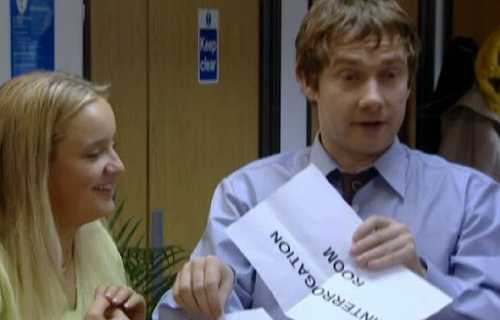
It soon becomes apparent that Gareth is terrible at questioning people, despite his claims he has “people skills” and is “trained in covert operations.” Most of the people he interviews, particularly Tim and Dawn, use the interview sessions as an excuse to make fun of and mess around with him. He does eventually manage to trace the photos to their source on Tim’s computer by checking everyone’s computer history and hard drive. Still, he fails to identify the real culprit, which turns out to be Chris Finch, the traveling salesman.
The Woman As Temptress: Take One
Also in the second episode, David introduces a pretty young woman named Donna, who is the daughter of some of his friends. Donna–whose name literally means “lady”–is one of two femme fatales to appear in The Office, the other being Rachel in Series Two. She poses a particular problem for Gareth because his greatest weakness is for women. As he himself admits in a talking head segment: “Yeah, I’ve had workplace romances. Loads. […] But they’re not a good idea [emphasis in original].”
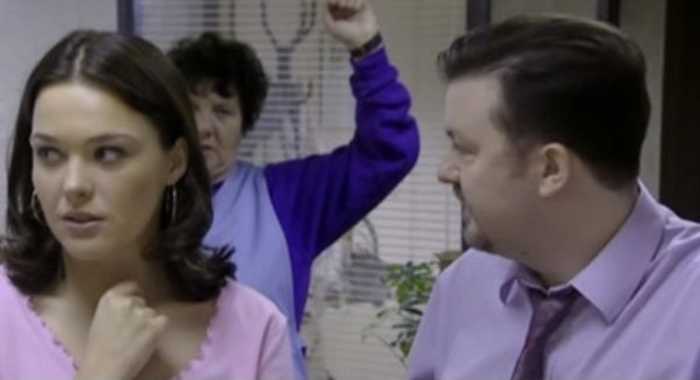
Traditionally, the role of the femme fatale was to seduce the hero in order to draw him away from his goal. In The Office, however, the roles are reversed. Although David warns Gareth to stay away from Donna, she is simply too luscious for him to resist. The first time he gets an audience with her, he attempts to impress her by arguing, somewhat lamely, that he is tough but also “caring and sensitive.” Crucially, a man who can be sensitive while also being strong, protective, and able to endure pain is exactly the sort of man that any good woman would want in a long-term partner, but Donna doesn’t buy for a second that Gareth is that kind of man. In a later episode he throws together a health and safety seminar as a pretext for speaking to her again, only to embarrass himself still further. Instead, Donna opts to seduce Ricky.
In the fifth episode, the Wernham-Hogg crew go to the local night club, Chasers. In so doing they undertake what is, in effect, an expedition to a dangerous place full of temptations and traps. As Gareth elaborates in a talking head segment:
Yeah, we go there every Wednesday night, and it’s a fun place, but it is full of loose women. My only problem with that is venereal disease. Which is disabilitating [sic]. Right, specially for a soldier.
12
Even the name of the club, “Chasers,” sound vaguely menacing.
On this particular night, Gareth finds himself making out with a dark older woman in leather. When the woman admits that she has a partner already, he moves away in disgust, claiming that he has no interest in doing anything that involves another man; that, indeed, he “wouldn’t even want him watching.” A bit later, though, Gareth sees Donna and Ricky together, and she spurns him entirely, calling him a “weasel-faced a–e.” After this final rejection by Donna, he follows the woman and her partner home anyway.
What Gareth is attempting here is, in effect, a form of self-mutilation. As Campbell points out, to cross the threshold from the Ordinary World into the Special World, a hero sometimes has to pass a test that requires his physical body to be damaged or destroyed 13. For similar reasons, many cultures around the world have required adolescent boys to undergo initiation rituals, in which “[t]he common thread was an experience that involved emotional and physical pain and required a boy to pass the test of manhood: to show courage, endurance, and the ability to control one’s emotions 14.” By consenting to a sex act that he does not want, Gareth is, in effect, offering his body as a sacrifice to prove that he is a man. Fortunately, he makes it through the experience in one piece.

Donna and Ricky, by the way, depart Wernham-Hogg at the end of Series One and are never seen or heard from again. It is admittedly doubtful how long they could have stayed in any case, but the timing of events suggests that Donna, who has never taken her work seriously, is at least partly responsible for luring Ricky away from his work responsibilities. In this respect, Gareth is lucky that she rejected him, or he might have been lured away from Wernham-Hogg as well.
The Sacrifice
In the final episode of Series One, Jennifer tells David that she has been promoted to a partner in Wernham-Hogg, and that he has been selected to take her place. David, despite his past overtures about his loyalty to the employees in Slough, accepts the position without much hesitation. He thus brings his staff members, including Gareth, face to face with the “death” of their careers. Naturally, the office workers are incensed, because David had specifically promised that he wouldn’t allow them to lose their jobs.
Also in the same episode, Gareth witnesses David fire a forklift-operator named Alex. Alex accuses David of giving his colleague, Anton, special treatment on account of his disability. In the very first episode, Gareth singled out Anton as unfit for the job he was assigned because of his disability. In addition to David’s broken promise to his branch, this event furnishes yet more evidence that David cannot be just.
Gareth, who is the last to know about David’s departure, is devastated by the news, because he had always thought that he and David were a team. When he goes to David’s office and asks if he can still be David’s assistant, David replies that he’ll be getting a “proper assistant.” Gareth asks if he can be Neil’s assistant, but Neil has already got one. Eventually, Gareth bursts into tears, and David tries to comfort him by reminding Gareth that he is a soldier.
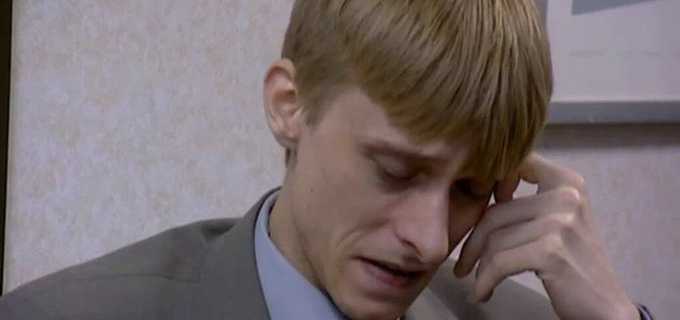
This conversation marks the beginning of the end of Gareth’s close relationship with David. Up until this point, he has displayed an eagerness to follow David wherever he goes. However, in Gareth’s deleted talking head segment from the episode, he doesn’t even mention David at all, but only his concerns about losing his job. He says:
It’s the first time I don’t feel certain that my job is safe. And I feel discarded. I mean, I understand that you have to throw away the dead wood, or the rotten apples to save the barrel, so if you find a lump in your testicle, then you got to lose it, for the good, and live on without it. Just that I’ve always thought of myself as a healthy testicle!
15
The implication is that Gareth really wants to be recognized for his work ethic, and has been hanging onto David because he feels he has no other choice. It would certainly be in character for David to encourage the belief that he was Gareth’s “only friend” in the business world, or “the only one who accepted him,” so that David could feel needed by him.
Later that evening, the Slough branch throws a party to celebrate the end of the fiscal year. This scene is what the entire episode was building up to, and it’s fitting that it takes place in a dark room lit only by strings of lights and a disco ball. There is a real sense of danger, anxiety, and uncertainty to it, as there would be at a sacrificial feast. It is also the only time in the series that Gareth is shown wearing a T-shirt instead of his usual business clothes, which suggests he already believes he has one foot out the door.
This scene is a very dark moment for Gareth, as it leads him to question everything he has stood for up to that point. As he sits at a table drinking and ranting to Tim and Ricky, he delivers the following ominous monologue:
I work hard and earn my keep, but, unfortunately, the history books are full of just people who toil and fight for worthy causes and the freedom of others and […] do all that only for foreigners or women or disableds to take advantage of it [emphasis added].
16
As previously stated, up to this point Gareth has tried very hard to be fair to others even if he hasn’t always succeeded. Now, however, it seems as though he is questioning whether it is even worth trying to be fair, since being fair supposedly leads to getting taken advantage of.
In the event, David’s employees receive a stay of execution when he comes to the party and announces that he was unable to accept Jennifer’s old post after all. Instead, Neil Godwin, the boss at Swindon, will take over for Jennifer and the Swindon branch will be incorporated into the Slough branch. What was a last hurrah now becomes a joyous celebration, as nearly everyone pairs up and dances with their loved ones. Gareth himself finally receives a reward for his troubles in the form of some positive female attention. One of the guests at the party is a pretty woman, who most likely showed up hoping to find a partner. Despite Tim warning Gareth that she is out of his league, he gathers up the courage to approach her and impresses her by showing off some light combat techniques. Later, he can be seen slow-dancing with her and looking at peace for the first time since the series began.
Now the first act of the Hero’s Journey is over and the second act can begin. To all intents and purposes, Gareth has left his “ordinary” life, and the person he used to be, behind and is now in a more special place, where new challenges and adventures await. As if to set the tone, David says at the very end of the episode, “Anything is possible.”
The Initiation Begins

Right from the very start, it’s clear that Gareth is not altogether the same person in Series Two as he was in Series One. He seems less anxious and more cheerful. As the first episode of the series begins, he can be seen humming a silly song from The Muppets Show. Eventually, another worker joins in, and the two sing together for awhile before David interrupts. This marks the first time Gareth is shown joking around with his colleagues.
One of the changes that has taken place is that by this point, Gareth has celebrated his thirtieth birthday. At the end of Series One, the staff of Wernham-Hogg celebrated the end of the fiscal year, which in Britain takes place on April 5 17. Series Two, according to Tim, takes place two weeks after Series One, or around April 19. Gareth was born on April 17, 1971 18, which means he turned thirty just a few days before the start of the second series. Thus, when Tim says in a talking head segment, “I’m thirty. Time to grow up, basically,” he might be speaking as much for Gareth as for himself.
Early on in the episode, Gareth tries to pull rank on Tim, claiming that he is Team Leader. Tim, who was promoted to Senior Sales Representative at the end of Series One, points out that technically he is now higher on the corporate totem pole than Gareth:
Tim: My job title actually means something, Gareth. I got a pay rise, I’m on a new scale. Team leader don’t mean anything, mate.
Gareth: Excuse me, it means a leader of a team.
Tim: It’s a title someone’s given to you, to get you to do something they don’t want to do, for free!
19
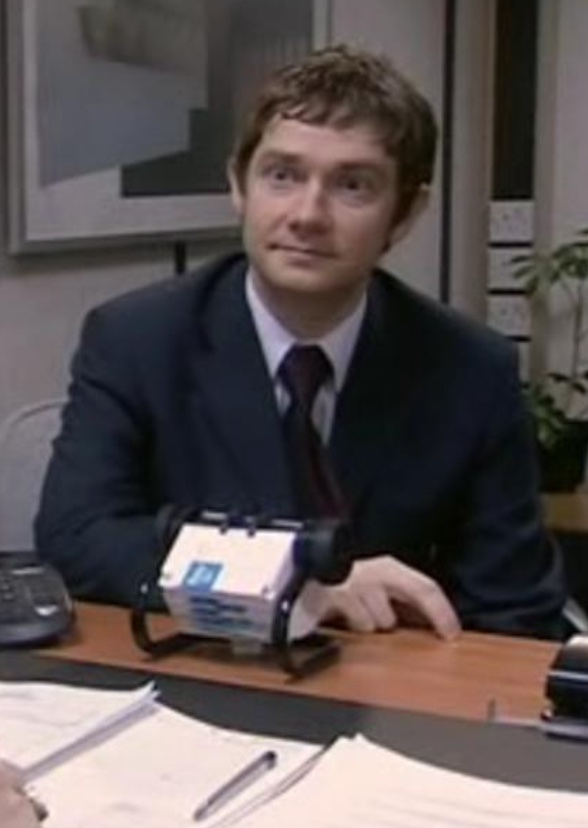
Although it may not seem like it, Tim is actually helping Gareth here by awakening him to the reality of his situation. David is perfectly happy to bestow upon Gareth all manner of important-sounding but ultimately meaningless titles; but the one promotion that was his to give went to Tim. Moreover, David promoted Tim not as a reward for working hard, but only to entice him to stay at Wernham-Hogg, instead of quitting as Tim had originally planned to do. It’s telling that, after this scene, Gareth never uses any of his made-up titles again.
New Challenges and New Friends
Most of the second series is taken up by what Campbell calls the “Road of Trials (sometimes also called “Tests, Allies, and Enemies” 20).” Once Neil and the rest of the transfers from Swindon arrive, Gareth is faced with the challenge of befriending them and convincing them that he is an honest and able colleague. Since David is the one who taught Gareth everything he knows, impressing him is easy; but can Gareth impress a fresh batch of people? He gets off to a less-than-promising start when he suggests that David, who is planning to welcome the Swindon transfers with a comedy routine, tell a racist joke about the British royal family.
Gareth’s initial introduction to the Swindon crew turns out to be a mixed bag. When Neil and David give their introductory speeches in the conference room, he behaves himself well enough. Later, at the after party, he attempts to bond with Brenda, a Swindon transfer who uses a wheelchair, by saying to her that he has “a mate who uses a wheelchair–well, he’s not my mate, I don’t like him very much.”
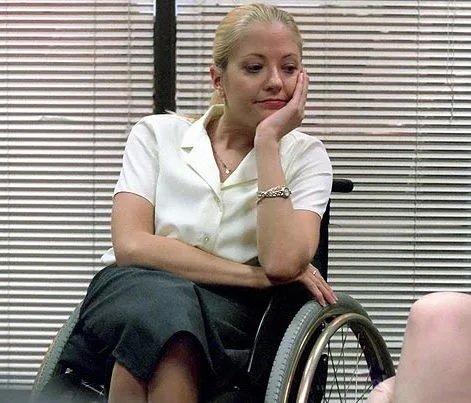
Things take a turn for the worse when David, who is frustrated about being ignored, tells the racist joke, which causes Jennifer to discipline them both. In what is transparently an attempt to cover his own backside, Gareth laments how difficult it is to keep up with the requirements of political correctness. He cites the example of his father, who used numerous outdated and offensive terms. Gareth claims to be greatly embarrassed by his father’s ignorance even though he uses at least a few of the same terms–and some that are even worse–himself!
It bears pointing out in this context that Gareth essentially has two father figures: his own biological father and David. Although David’s parental tendencies toward his staff are not emphasized nearly as much as in some other versions of The Office–particularly the US Office and Stromberg–David still refers to himself as “the head of this family” in Season One, and Jennifer similarly says to him at one point, “I know you’re very loyal to your family here.” Thus, it’s possible that Gareth is using his father as a stand-in for David, and trying to hint at the embarrassment David causes him without being too obvious.
To his credit, although Gareth says a lot of nasty things about minorities in general, he is rarely cruel to the minorities he works with. It is David who insists on repeatedly singling them out for any qualities they have that make them different. Gareth may at times join in, but David is always the instigator. The one exception to this rule is Gareth’s homophobia, but even this is usually brought on by Tim and his friends making unwelcome insinuations about his sexuality. At the same time, there don’t seem to be any out gay workers at Wernham-Hogg, so it is unclear how Gareth would react to an openly gay person if he actually met one.
The following day goes a little better for Gareth, as a fire drill in the office building finally gives him a chance to prove himself. As soon as the alarm goes off he immediately springs into action, holding the door open and ushering everyone else out of the office so they can get to safety. Unfortunately, David sabotages his efforts at the last minute. In an attempt to look like a hero, he offers to have himself and Gareth carry Brenda down the stairs rather than allowing her Swindon colleagues take her to safety. When she proves too heavy for the two of them to carry all the way down, they leave her stranded on a landing until the drill is over.
In a deleted scene cut from the episode, Tim and Dawn come across a diagram Gareth has drawn of a slide that would allow wheelchair-users to exit a building safely in the event of a fire. The scheme he concocted is in many respects a silly and insensitive one (sample text includes “make sure there is a normal person waiting to stop them flying off the other end”) 21. At the same time, it shows that he wants to come up with a solution so that disabled employees don’t get stranded in an emergency.
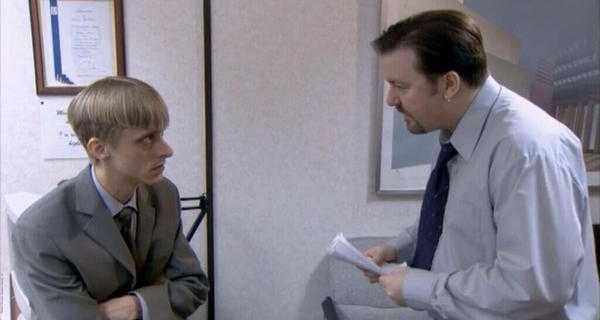
By the fourth episode, it becomes apparent that Gareth is beginning to value the opinions of his new Swindon coworkers just as much as, if not moreso than, David’s. David receives an invitation from a consulting firm to give a motivational speech. He takes Gareth aside so he can have someone to practice with, and asks Gareth to insult him so he can devise some comebacks. In response, Gareth reveals to David that the Swindon transfers are making fun of him and calling him by insulting nicknames. When an incensed David goes out to confront them, Gareth begs him to stop because “They’ll know it’s me that told you!” In other words, Gareth would now rather be seen as one with the rest of the office workers than as David’s special favorite or primary defender.
Finally, in the last episode of the series, Gareth can be shown sitting and eating lunch in the break room with his coworkers from both branches. They’re having an awkward conversation about sex, which Gareth makes some contributions to. Although nobody looks especially happy to be there, Gareth is, for the first time, being included in the group, instead of sitting apart by himself. He also manages to avoid saying anything more awkward or embarrassing than anyone else. What all this suggests is that he has finally earned their friendship–at least to a limited degree.
Inscrutable Neil
At the beginning of the second series, Neil Godwin is introduced as David’s new boss. Before the merger, he was David’s counterpart in Swindon. Neil is a suave, sophisticated, modern man who effortlessly keeps up with the times and understands the politics of the moment. His staff are also a lot more diverse than David’s, and Neil himself might be biracial (his actor, Patrick Baladi, is the son of a Syrian father and an English mother 22).
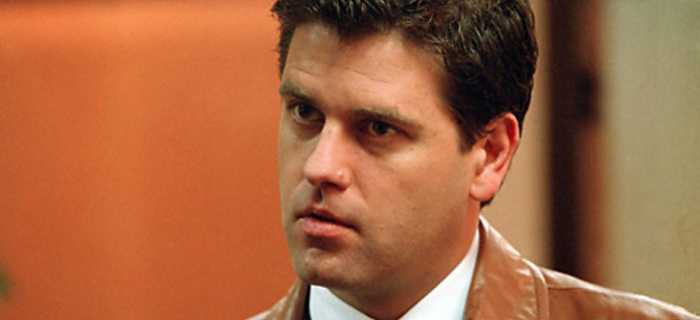
Although Neil is a far more serious and competent boss than David, it’s not altogether clear he is a preeminently virtuous man. On the one hand, he demonstrates some sense of modesty when he tells David, “I was mildly embarrassed that we were equivalents and now I’m your boss, but that’s the deal.” On the other, he seems to consider Chris Finch, the obnoxious traveling salesman, a close friend, and the two joke around together, often at David’s expense. In fairness to Neil, it could be the case that he genuinely doesn’t realize how horrible Chris Finch is, because the latter is always on his best behavior in front of him. It’s immensely difficult to discern Neil’s true feelings and motives most of the time because the series never provides his side of the story–only David’s assumptions about him.
From Gareth’s perspective, Neil is an almost godlike figure, whose primary concern is to dish out orders that Gareth must comply with and cannot influence (it is perhaps telling that Neil’s surname, Godwin, literally contains the word “god” in it). Neil, for his part, generally follows Chris Finch’s lead of treating Gareth as if he were beneath his notice. On at least one occasion, he disciplines David while Gareth is still in the room, without acknowledging his presence. This is likely because Neil is a rather superficial man, of the sort who would regard Gareth as little more than a crude, uneducated upstart. As such, Gareth cannot petition Neil directly. He requires the assistance of an intermediary such as David, Tim, or Rachel.
The Woman As Temptress: Take Two
Of all the transfers from Swindon, the one that Gareth interacts with the most is Rachel, the second of the series’ femme fatales. Gareth first sees Rachel at the welcome party in the first episode and is instantly smitten. She’s beautiful, intelligent, funny, and a bit of a bad girl. She wears very casual, tight-fitting clothing around the office and is sometimes shown smoking and drinking. She knows that she’s sexy and she’s not afraid to explore her sexuality–in a deleted scene, when Dawn teases Gareth by pretending to be a lesbian, Rachel tells her that “I’ll give anything a go once 23.” Her somewhat witchy qualities come to a head in a scene from the last episode, in which she invites Tim to join her and her family at a cottage deep in the woods.
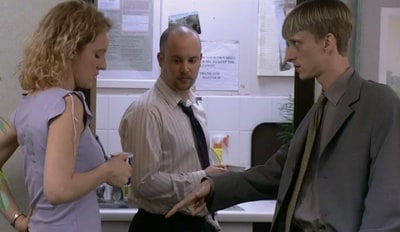
In a talking head segment from the second episode, Gareth notes that Tim seems to like Rachel as well, but is confident that he will succeed with her because he is a more attentive lover than Tim. The crucial takeaway from this scene is that it’s clear Gareth views women as more than just blow-up dolls. He understands perfectly well that he has to give them something in exchange for all the sex, “and that could be anything from making sure she’s got enough money to buy groceries each week to making sure she’s gratified sexually after intercourse.” Once again, he demonstrates a desire and a capability to be a decent human being, but he’s forced to learn through trial and error. This statement also feeds into his love of fairness, as it shows a reluctance to take without giving.
In any case, Rachel shows little interest in Gareth, and instead attempts to seduce Tim and make a man out of him. Tim may have wanted to get over Dawn or make her jealous, but it’s clear that Rachel is the one setting the pace of the relationship. She does seem to have some doubts about whether Tim is capable of satisfying her sexually, as in the second episode she goes so far as to ask Gareth: “What if I do go all the way with Tim but I want a little more with you?”
The most fascinating conversation to this effect takes place in the third episode of the season, when Tim steals a dildo that Trudy, another office lady, had received as a birthday present.
Rachel: You like that, don’t you? Is that because it looks like yours?
Tim: It’s identical. But mine’s not that size, it’s very, very tiny. But it is made of plastic.
Gareth: Mine’s massive and it ain’t made of plastic.
24
On the face of it, this seems like a very strange conversation. However, the characters are actually speaking in code. Rachel isn’t really asking Tim a question about his penis per se, but his manhood writ large, and his response makes it pretty clear he finds the very idea of “manliness” absurd. By contrast, Gareth, who genuinely aspires to be a proper man and be seen as one, answers her question much more earnestly.
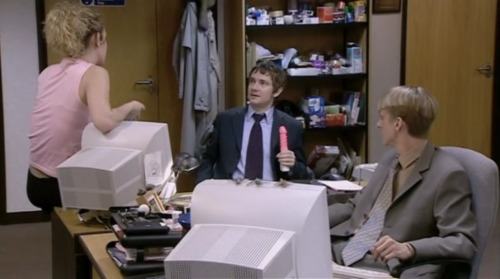
In the end, Gareth never does win Rachel’s heart, and he makes a fool of himself many times over while trying. Still, for all the trouble Rachel causes Gareth, she serves one important purpose: namely, driving yet another wedge between him and David. In the second episode of the season, Gareth remains at the office over his lunch break to play ball with Neil and Rachel, rather than accompanying David to the pub with the rest of the Swindon transfers. When David returns from his disappointing lunch, he lashes out at Gareth and calls him “selfish” for not accompanying him. Gareth also allows Rachel to rope him into her and Tim’s pranks on David.
Rachel fully comes into her own during Red Nose Day, when she and Neil dance together in order to raise money for Comic Relief. At last she takes her place at Neil’s right hand, where she belongs, and blows all the men away with her beautiful red dress and her dancing talents. Gareth is so entranced that after the dance is over he can be seen digging through his pockets for loose change, even though he has previously shown no interest in charitable giving (in a deleted scene, he states in a talking head segment that “You know, I work hard, I spend money on myself. That’s my reward.” 25). Conversely, even before David begins his own infamous dance Gareth looks a little apprehensive, as if he already knows it’s going to be an embarrassment.
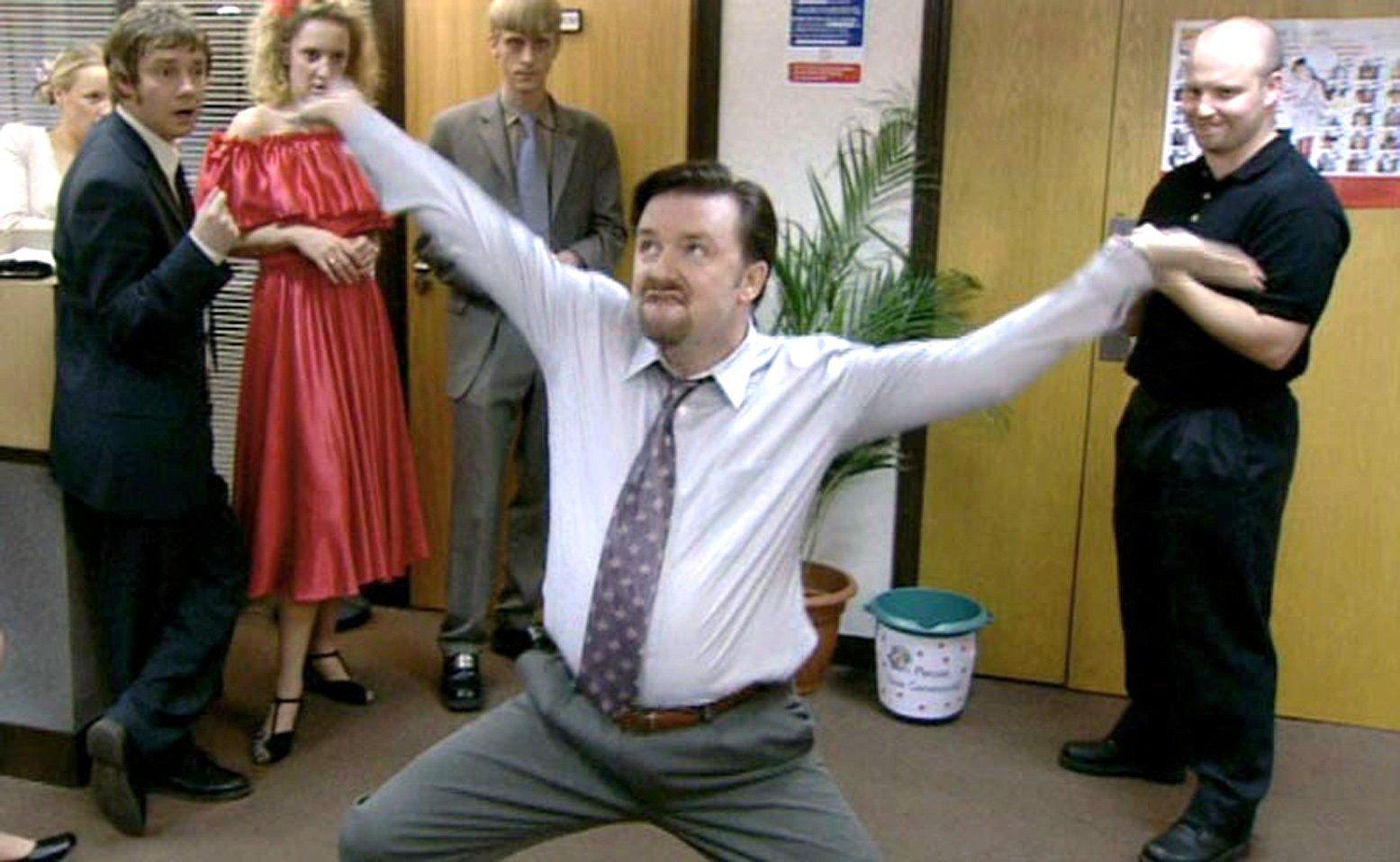
The Final Meeting With David
In Campbell’s Monomyth, the hero has to prove himself worthy by facing down a feared or mistrusted father figure.
Whether he knows it or not, and no matter what his position in society, the father is the initiating priest through whom the young being passes on into the larger world. […] [T]here is a new element of rivalry in the picture: the son against the father for the mastery of the universe […].
26
At the end of Red Nose Day, David learns that he is to be fired for incompetence, and sets about preparing his departure from Wernham-Hogg. Not long afterwards, in a scene that was sadly cut from the final episode, Gareth goes to visit him in his office again. This scene mirrors the meeting in David’s office at the end of the first series, but this time the terms are very different. Gareth no longer wants to follow David on his future adventures; instead, he wants David’s old post. He lays out his concerns, saying: “I’m worried, if Tim gets your job that’d be unfair. I’ve been here a lot longer–” David, who is incensed that Gareth is more concerned about getting the post than the fact that he is leaving, responds by lashing out at him yet again, saying: “Of all the people you’re the mercenary, you’re the one I’m disappointed–!” Gareth then says to David: “If there’s one thing you’ve taught me in business, it’s strike while the iron’s hot.” However, when David asks Gareth to name other things he has taught him, Gareth has nothing to say 27. The upshot of the whole business is that Gareth has realized that he doesn’t need David anymore–except as a patron. He can be just as good a boss as David, maybe better, if only David will use his influence to convince Neil to anoint him.
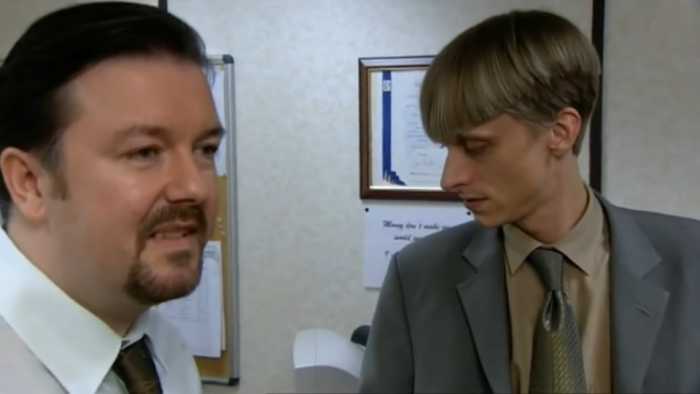
Unfortunately, David, who has been slowly spiraling into madness ever since the series began, is too far gone to render any assistance to Gareth. Instead, Gareth’s big break comes courtesy of David’s younger counterpart, Tim. When Neil offers Tim a chance to take over David’s role, Tim declines the position and instead suggests Neil give it to Gareth.
Although it may seem like a foregone conclusion that Gareth will become the boss once Neil pitches the offer to him, it’s important to note that he also has a choice to make. Theoretically, he could reject Neil’s offer and refuse to take over from David. The fact that he does not suggests that he understands a key facet of leadership. A real leader is one who steps up to the plate, or, as the Ethics of the Fathers puts it, “In a place where there are no men, strive to be a man 28.” It’s telling that, when Tim makes the case for Gareth as a boss, he says: “He takes things seriously, he’s conscientious, he works hard, he’s responsible, he knows the place inside and out….” All of these qualities that Tim lists are traits that people associate with a mature man.
Gareth’s Ultimate Reward
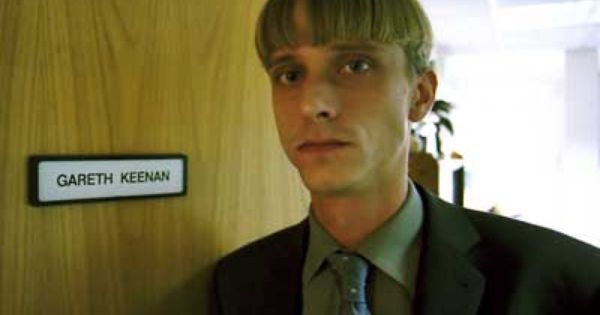
And so, at last, Gareth finds himself gifted, by Neil, the very thing he has been working towards this entire time: an executive position at Wernham-Hogg. The actual meeting with Neil happens off-screen, in the very same room that Gareth used to investigate the pornographic picture and prepare his quiz questions in Series One. However, Neil is not merely rewarding Gareth, but rather administering him a final exam of a sort. He, in effect, hands Gareth the keys to the corner office and tells him not to mess things up.
When he is first promoted, Gareth says to Tim:
Things are gonna start changing around here so you can start bucking your ideas up. Starting with your appearance. It’s gonna be a well-oiled, tight ship around these here parts.
29
Most of the actual changes that Gareth ends up making also take place offscreen. In a way, this is in keeping with the series itself, which concentrates most of its energies on filming David and Tim (and, to a lesser extent, Dawn), whilst leaving Gareth to fend for himself. Of course, none of this is surprising when one considers that Gareth, due to his lack of vanity, rarely seeks out the spotlight, and even seems somewhat uncomfortable being filmed most of the time.
Still, there’s no denying he’s a capable boss. When Neil first approaches Tim he asks him to take a role of “caretaker-manager,” until they can hire someone else to be the boss. However, in the Christmas special, which takes place nearly three years later, Gareth is still the manager in Slough. The fact that he has stayed on as long as he has suggests that people like having him there, and are satisfied with his work.
The Return Journey
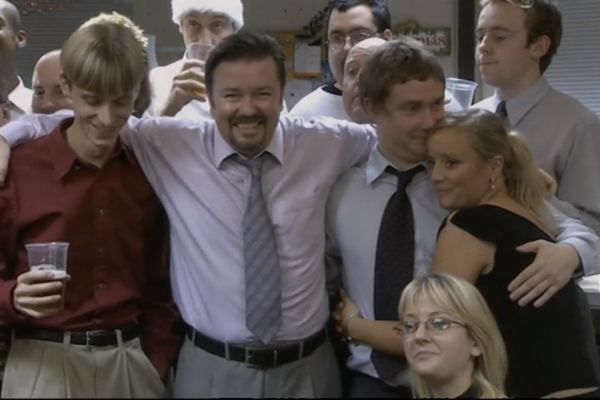
From Gareth’s perspective, the conclusion of Series Two could be a happy ending all on its own. Unfortunately, his friends are not so lucky. Not only has David been unceremoniously fired from his job, but Tim and Dawn are separated from one another, the latter having relocated to Florida with Lee. This is where the final part of the Hero’s Journey, the Return, comes in. Campbell states clearly in his book that it is not enough for the hero to undergo his own journey of self-discovery, but that he must share what he has learned and gained with his compatriots back at home.
When the hero-quest has been accomplished […], the adventurer still must return with his life-transmuting trophy. The full round, the norm of the monomyth, requires that the hero shall now begin the labor of bringing the runes of wisdom, the Golden Fleece, or his sleeping princess, back into the kingdom of humanity, where the boon may redound to the renewing of the community, the nation, the planet, or the ten thousand worlds.
30
The Gareth of the Christmas special is a very different person from the Gareth of the series proper, especially the beginning of the series. He is a man secure in his role and in control of his own destiny, Tim’s pranks and annoyances notwithstanding. Even his appearance is subtly different. In the main series, he always wore a gray suit jacket and very dull-colored shirts, which, when coupled with his light skin and hair, caused him to blend into the background of the drab gray office environment. For most of the Christmas special, however, he’s shown wearing a black tailored suit and an intricately-patterned tie, which signifies that people have to look at him now. In every respect he looks, and acts, more grown-up.
In his final talking head segment, he appraises his situation thusly:
I did learn a lot from David, I learned from his mistakes. Okay, we’re very different people. He used humor where I use discipline. And I learnt that nobody respects him.
31
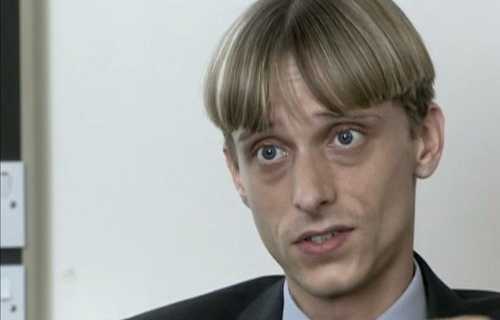
He also illustrates repeatedly throughout the special that being a strict and demanding leader has nothing to do with being controlling or thinking oneself better than anyone else. For instance, he allows his staff to decide on the entertainment for the Christmas party, and tries to incorporate suggestions from everyone. When he first announces that Dawn will be returning to Wernham-Hogg, he ends his announcement by telling everyone to get back to work, but quickly follows up with “Please?” Later, at the Christmas party, he can be seen trying unsuccessfully to speak to former Wernham-Hogg employees who have gotten rich from working there. When he spies his friend Monkey Allen, the warehouse worker, though, he immediately rushes off to greet him, suggesting that he has not allowed his status as executive to go to his head or make him a snob.
The late British rabbi Jonathan Sacks wrote that humility was the key to true leadership, in both the religious and secular worlds.

You do not have to be religious to understand the importance of humility. In 2014 the Harvard Business Review published a survey that showed that “The best leaders are humble leaders.” They learn from criticism. They are confident enough to empower others and praise their contributions. They take personal risks for the sake of the greater good. They inspire loyalty and strong team spirit.
32
Gareth’s first mission in the Christmas special is to pull David out of the pit of despair into which he has fallen. Although his new job as a traveling salesman keeps him busy, David still returns to the office in Slough as much as he can. This time, David is the one who meets Gareth in his office. Yet, even though Gareth is the boss, David treats him with no more respect than he had previously. He continues to insult Gareth’s intelligence, disrupt his work, steal the spotlight from him, and argue that Gareth is not a “real” boss in the same way David was.
Of course, this reaction is to be expected. It’s pretty obvious that David has always seen Gareth as his social inferior. Whether he consciously admits it or not David very likely cultivated a friendship with Gareth, in part, to feel better about himself, whilst reassuring himself that Gareth would never outshine him. To see Gareth sitting in his old office and giving orders to his former staff must be exceptionally painful for David. It is unlikely that David would have the same strong negative reaction if Tim were in Gareth’s place, although he would likely still be upset that he was no longer in charge.
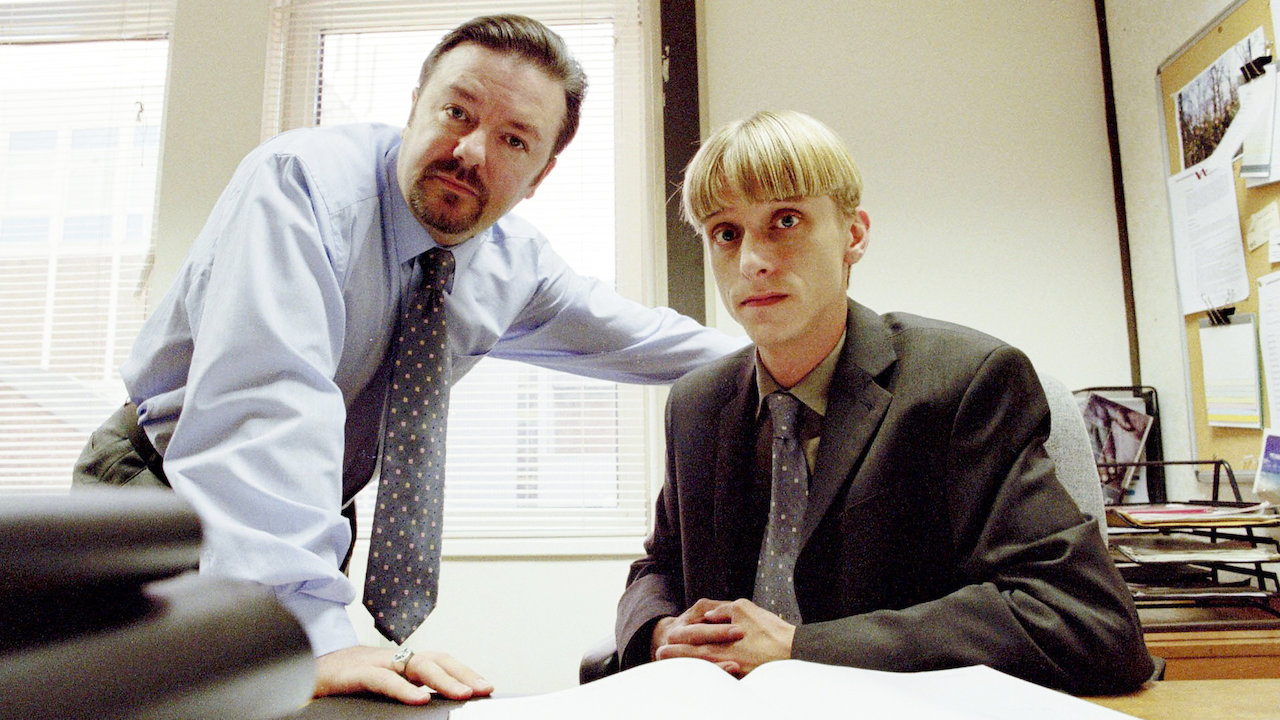
The scene that illustrates this dynamic most poignantly comes about in the second half of the Christmas special, in which Gareth informs David that he wasn’t invited to Wernham-Hogg’s Christmas dinner. Gareth patiently explains that only current employees are invited to attend, and reassures David as if he were a child that he isn’t being singled out and that Dawn–who is also in town–will not be in attendance either. Perhaps to spare his old friend’s feelings, Gareth says: “I could probably have a word with Neil if you want me to.” Whether Gareth intends to follow through on this offer, or whether it would make any difference even if he did, is a moot point, because David replies: “Nothing you can do, you’re just a puppet.” Even after everything that’s happened, he still refuses to accept that Gareth could have any power over what happens to him.
Regardless, early in the special, Gareth convinces David, who has been having trouble finding a girlfriend, to set up a profile on a dating website. This profile gets several positive responses, although David sabotages nearly all of the dates he goes on. Eventually, though, he invites a woman named Carol to the Christmas party at Wernham-Hogg and seems to genuinely connect with her. YouTuber Full Fat Videos breaks down their interactions thusly:
From meeting Carol, he learns what a real relationship could be like, and thus, opens himself up. This exposes him to the kind of relationship–or friendship–that he craved from his staff but could never quite understand. This is doubled down upon when David finally stands up to Chris Finch. […] Here he finally relinquishes the hollow substitute he had for a friendship with Chris Finch. He has experienced something more authentic, and realized that he is better off without him–and his approval.
33
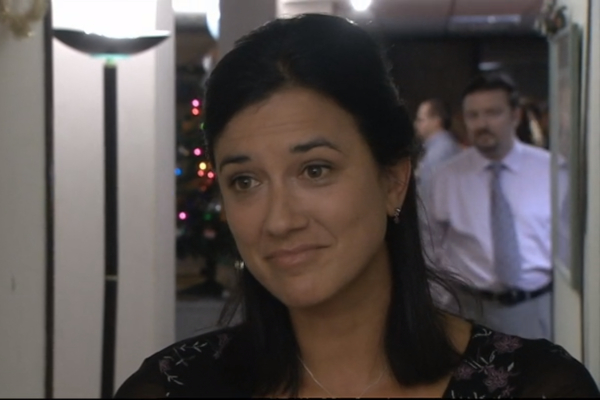
It goes unremarked, however, that none of this would have happened if Gareth had not set up a dating profile for him in the first place. In other words, although David has no way of knowing it, he effectively owes his newfound happiness to Gareth!
The next thing Gareth does is invite Dawn back to Wernham-Hogg. Dawn had quit her job at Wernham-Hogg at the end of Series Two in order to travel with Lee, but she and Lee decide to return for the Christmas party after the documentary crew offers to cover the cost of their flight to Slough. When she returns to the office, everyone–including Gareth–greets her warmly, and when she joins him in his office, along with Tim, Gareth informs her that he can find her a job if she ever decides to return. Gareth tells her that he is “quite a powerful man,” but crucially, he is never shown using his power to enrich himself. Instead, he uses it to help a friend.
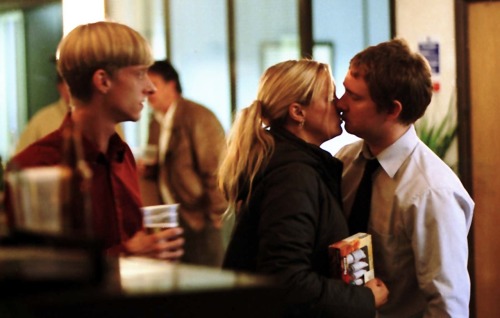
It is, suffice it to say, difficult to imagine Dwight Schrute, from the US Office, doing anything so selfless. The closest equivalent comes at the end of the series, when he fires Jim and Pam in order to give them large severance packages so they can follow their dreams. However, in this case, Dwight is doing something that works out to everyone’s benefit–his and theirs. By contrast, Gareth gains nothing by offering Dawn another job at Wernham-Hogg, especially since he knows how much she enjoys Tim’s pranks on him. He does it simply because he cares about her and doesn’t want her to struggle. In the end, Dawn does come back to Wernham-Hogg for good, so that she can be with Tim. By the time she and Tim get together, Gareth has effectively pulled all three of his friends up to the same level of happiness he himself reached years ago.
Gareth the Saint
What makes these developments so remarkable is that David and Tim are horrible to Gareth more often than not, and even Dawn gives him a hard time quite frequently. Anyone can be courteous and helpful to someone they like or find attractive–even Chris Finch is able to grasp this concept. For someone to show kindness to a person they don’t get along with is a much harder thing to ask, yet this is exactly what Gareth does, again and again. What all this suggests is that Gareth has come to love his costars–not romantically, but in a sense outlined by C.S. Lewis in Mere Christianity:
[W]e must try to feel about the [other person] as we feel about ourselves–to wish that he were not bad, to hope that he may, in this world or another, be cured: in fact, to wish his good. That is what is meant in the Bible by loving him: wishing his good, not feeling fond of him nor saying he is nice when he is not.
34
This is a pretty accurate description of how Gareth treats David and Tim throughout the Christmas special. He is, presumably, under no illusions about the kinds of people they are, but he meets them where they are at and tries to help them regardless. Of course, they may still bully him, annoy him, or fail to take him seriously–but that’s their problem, not his.
In his video essay on the British Office, YouTuber Jesse Tribble says: “Gareth isn’t sociable, but he has a good job 35.” The reality, however, is that by the time the series ends, Gareth’s social future is just as bright as his financial future. After all, if he can act in a kind and loving way towards even someone like David or Tim, then he can potentially learn to love anyone.
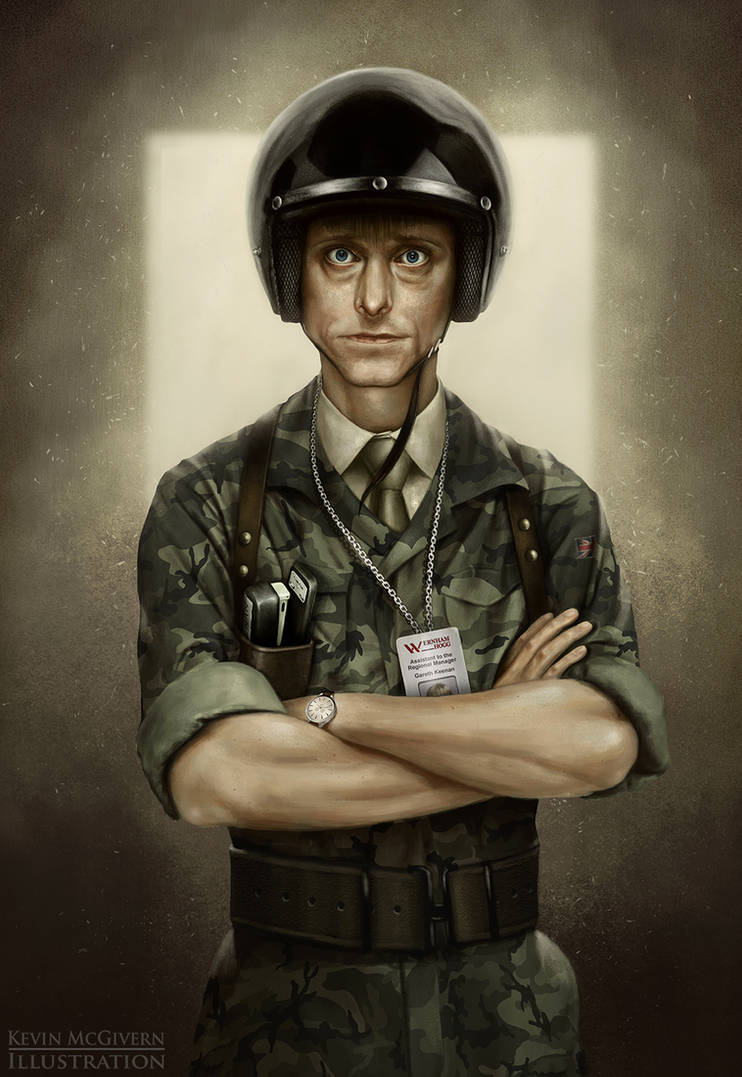
At first glance, the idea that Gareth Keenan could be the true hero of The Office might seem absurd. However, the series contains more than enough evidence of his character development and good deeds, if one troubles to look for them. Throughout The Office’s fourteen episodes, he comes of age, proves himself as a boss, and helps his friends overcome their own hardships. He does all this, moreover, whilst taking essentially no credit for any of it–even from the camera crew! Not only is Gareth a fascinating character, but he is also something exceedingly hard to find in any adaptation of The Office anywhere: a genuinely good person.
Works Cited
- “Dwight Schrute: The Hero’s Journey.” YouTube, uploaded by 10K Productions, 10 September 2019. https://www.youtube.com/watch?v=H7Kl_u4_iz8 ↩
- Campbell, Joseph. The Hero With a Thousand Faces. Pantheon Books, 1949 ↩
- Vogler, Christopher. “How The Lion King Got the Hero’s Journey Treatment.” Chris Vogler’s Writer’s Journey Blog, 7 August 2019. https://chrisvogler.wordpress.com/2019/08/07/how-the-lion-king-got-the-heros-journey-treatment/ ↩
- Driscoll, Rob. “Hot Potato.” Western Mail, 21 February 2004. Retrieved from https://www.thefreelibrary.com/Hot+Potato.-a0113519755 ↩
- Campbell, 1949 ↩
- “Brent the Peacemaker.” Disc two. The Office: special edition, produced by Ash Atalla, BBC Worldwide Ltd. Program, 2011 ↩
- Looch, Cassam. “10 Reason Why Tim Was The Real Villain Of The Office.” Culture trip, 28 August 2016. https://theculturetrip.com/europe/united-kingdom/articles/10-reasons-why-tim-was-the-real-villain-of-the-office/ ↩
- Fullmer, Andie. “Jung’s Trickster: The Archetype Hidden In Your Favorite Cartoons.” The Arcanist, 16 January 2019. https://thearcanist.io/jungs-trickster-the-archetype-hidden-in-your-favorite-cartoons-6da53b095471 ↩
- “Pilot.” The Office, created by Greg Daniels, season 1, episode 1, Reveille Productions, 2005 ↩
- Lewis. Clive Staples. “The ‘Cardinal Virtues.'” Mere Christianity, C.S. Lewis Pte. Ltd., 1952, pp. 79 ↩
- Campbell, 1949, pp. 44-47 ↩
- “New Girl.” The Office, created by Ricky Gervais & Stephen Merchant, season 1, episode 5, BBC 2, 2001 ↩
- Campbell, 1949, pp. 74-75 ↩
- McKay, Brent & Kate McKay. “8 Interesting (and Insane) Male Rites of Passages from Around the World.” Art of Manliness, 25 September 2021. https://www.artofmanliness.com/character/behavior/male-rites-of-passage-from-around-the-world/ ↩
- “Gareth’s Anxiety.” Disc two. The Office: special edition, produced by Ash Atalla, BBC Worldwide Ltd. Program, 2011 ↩
- “Judgement.” The Office, created by Ricky Gervais and Stephen Merchant, season 1, episode 6, BBC 2, 2001 ↩
- “Important Dates in the UK Financial Year – Key 2021 UK Tax Dates.” Taxback.co.uk. https://www.taxback.co.uk/important-dates-in-the-uk-financial-year/ ↩
- BBC. “Gareth Keenan’s Homepage.” BBC, 2014. Retrieved from https://www.bbc.co.uk/comedy/theoffice/gareth/ ↩
- “Merger.” The Office, created by Ricky Gervais & Stephen Merchant, season 2, episode 1, BBC 2, 2002 ↩
- “Dwight Schrute: The Hero’s Journey.” 1:37-1:39 ↩
- “Deleted scenes.” Disc three. The Office: special edition, produced by Ash Atalla, BBC Worldwide Ltd. Program, 2011 ↩
- IMDb. “Patrick Baladi: Biography.” The Internet Movie Database. https://www.imdb.com/name/nm0049346/ ↩
- “Deleted scenes.” Disc three. The Office: special edition, produced by Ash Atalla, BBC Worldwide Ltd. Program, 2011 ↩
- “Party.” The Office, created by Ricky Gervais & Stephen Merchant, season 2, episode 3, BBC 2, 2002 ↩
- “Deleted scenes.” Disc three. The Office: special edition, produced by Ash Atalla, BBC Worldwide Ltd. Program, 2011 ↩
- Campbell, 1949, pp. 147-148 ↩
- “Deleted scenes.” Disc three. The Office: special edition, produced by Ash Atalla, BBC Worldwide Ltd. Program, 2011 ↩
- Pirkei Avot 2:5 ↩
- “Interview.” The Office, created by Ricky Gervais & Stephen Merchant, season 2, episode 6, BBC 2, 2002 ↩
- Campbell, 1949, pp. 148 ↩
- “Christmas Special: Part 1.” The Office, created by Ricky Gervais & Stephen Merchant, Christmas specials, BBC 2, 2003 ↩
- Sacks, Jonathan. “The Greatness of Humility.” Chabad.org. https://www.chabad.org/parshah/article_cdo/aid/3424056/jewish/The-Greatness-of-Humility.htm ↩
- “The Office: The Power of David Brent: Video Essay.” YouTube, uploaded by Full Fat Videos, 28 January 2019. https://www.youtube.com/watch?v=A1_aU6zaiyo ↩
- Lewis, Clive Staples. “Forgiveness.” Mere Christianity, C.S. Lewis Pte. Ltd., 1952, pp. 120 ↩
- Tribble, Jesse. “The Office – I. Hate. People.” YouTube, uploaded by Jesse Tribble, 5 July 2019. https://www.youtube.com/watch?v=wwHdKDpBYXM ↩
What do you think? Leave a comment.










Gareth is an absolutely hilarious character, but he is definitely autistic, and that’s a little bit close to reality to be a good source of humour.
I actually don’t think Gareth is autistic at all, for a number of reasons. For one thing, autistic people tend to be very literal, but Gareth is completely comfortable and fluent in non-literal language; we see him use figures of speech, sarcasm, and slang quite frequently, for instance. He also spends quite a lot of time trying to analyze or talk about people’s mental and emotional states, and even shows some ability to “code-switch”–that is, to change his mannerisms and speech patterns based on who his audience is. Someone who was actually on the autism spectrum would have quite a lot of trouble doing any of these things. Moreover, his facial expressions, gestures, and speech patterns are a lot more naturalistic and less stilted than those of, say, Dwight (who I don’t really think is autistic either, but there is at least more of a case to be made for him). Gareth might still have neurological issues, of course, and in fact probably does; but autism isn’t one of them.
Gareth I’d say is on the autism spectrum. He is very intelligent, only has many cognitive blind spots. The most obvious being his poor ability to decipher sarcasm. You will notice he only displays sarcasm when criticising what he perceives as impractical eg. Telling a joke in battle. Being on the spectrum myself, I can display similar blind spots which even intelligent people will automatically perceive me as either slow or they will involuntarily subconsciously Form a diminished perception of my capacity. Sheila is the only character in the office who is genuinely dim, but she makes up for it being a gentle kind and sensitive soul.
I can’t understand how people think that the US Office is better than the UK Office. Ricky Gervais and Steven Merchant are geniuses.
Gareth’s logic is impeccable.
Every office has that one co-worker you want to slap.
One thing that makes the UK show distinct from the US office, and a lot of other mockumentaries. Is it isn’t afraid to alude to the characters lives outside of the show. Makes everyone feel like real people.
I’m a massive fan of the office and the more I watch the more I think Gareth was okay and it was Tim who was the difficult one.
You’re absolutely right. One of the things that gets to me is that Tim clearly has a double standard about his “jokes.” It’s apparently perfectly fine for him to play mean-spirited pranks on Gareth, but the moment someone tries to do the same thing to him (thinking here of the scene in episode 3 where Chris Finch steals his shoes and throws them over a building) it’s not funny anymore. We also see that Tim gets annoyed with Gareth simply for ripping paper too loudly, but he disrupts Gareth’s work on purpose and just expects him to grin and bear it. He can dish it out, but he can’t take it, basically.
I know Gareth is supposed to be extremely unlikable in the show but I do kind of like it that he’s got such an active social life and seems to have many friends.
That is one of the things I find interesting as well. What fascinates me is that if you read between the lines, it’s clear that Gareth doesn’t actually lack social skills as such. Even his job is a dead giveaway, because he works as a salesman–a position that would require him to negotiate with other people in fairly sophisticated ways. The scenes in which he has social difficulties nearly all take place between him and his coworkers (or boss) in the office. His interactions with women are a good example: he never manages to win over any of his pretty female coworkers, but during the party at the end of the first series we see him convince a pretty woman he doesn’t work with to dance with him without much effort. What all this suggests to me that it’s the workplace itself that has him especially agitated, and this causes him to act out.
The kinds of friends that will never help him get any further in life than this though haha
I think they’re all supposed to be unlikeable, that’s largely the joke of The Office. But Gareth is perhaps the most obnoxious. He’s juvenile, self important, incredibly sexist and completely lacking in self awareness. Probably why I find some identification with him.
That’s right.
Although to newcomers to the show, Gareth seems like an arrogant oddball whos probably a loner.
Gareth is clearly a red pill guy.
Is this a good or a bad thing?
It depends on your political affiliations.
After watching the American version, I loved Dwight a lot lot lot more. There’s something more genuinely awkward in Dwight.
The most irritating thing about Gareth was his haircut. He seriously needs to stop letting his mum cut it, or find a new bowl.
Or ditch the bowl altogether.
I am always critical of fiction (or non-fiction) copying from an original script, but the US version is simply so much better, if Gareth is supposed to mirror Dwight’s character, well it’s not even close to Dwight. The US is so much deeper in character, the number of characters, the writing is so much better.
Gareth isn’t meant to mirror Dwight though. He was his own character, and then when the US version was made Dwight was intended to roughly correspond to Gareth but then became his own character too. It’s a pointless comparison.
The UK version is a lot more grey-er than American one & depending on your preferable type of humor you might actually even like it more than the American one. Both shows are great but significantly different too.
It’s just funny watching people fight over which ones is better
He reminds me of myself when I was in High School.
Is it me or Gareth is a cosplay of Doofus Rick?
I want to know how long it took to put on the prostheses and makeup to make his head look like that. That’s some uncanny valley… it looks so close to human but just far enough away to be creepy.
Some of the best comedy script ever written. Thank you Gervais.
I’ve never watched the British office before. YouTubed a few scenes. It’s so funny! Love the American version but British humour has a fantastic subtlety about it.
I had a work colleague just like Gareth. He was a lieutenant in the air corps on a Saturday morning! And I kid you not, his name was Andrew!
I like how none of the characters in the show are spared humiliation. Like, you have the obvious idiots (i.e. David, Gareth etc.) but Tim and the rest of the cool people have their moments too.
This is an interesting article that points out how the writer of the show “The Office” draws references from Joseph Campbell’s The Hero’s Journey for much of the story. There is the call to adventure in the office, the challenges to the main character, the sacrifices made, and finally, the return journey where the office company establishes the new status quo. We see David, the main character or ‘hero,’ transformed into a leader by inspiring loyalty and team spirit in his co-workers. This show has well-rounded characters and tells a classic coming-of-age story.
Yes!
Gareth has very much an agape love and even a philos love.
And I like the way you ended the article.
“He can learn to love pretty much anyone”.
We see so many people [the audience] love – and respect – him too.
I think too of shows like MAD MEN in the 2000s and 2010s and TED LASSO a few months ago [so early 2022].
[especially the nuanced role of advertisers and salespeople in MAD MEN and looking outside the show].
Also the way Debs explored the Hero’s Journey through Gareth’s experiences in THE OFFICE and used all the YouTubers and their in-depth recaps.
Humiliation comedy in a realistic setting is not normally a place I desire to go – a tread on my own corns and those of others, perhaps.
It’s a shame nowadays how snobby some people have become about Ricky Gervais and his genius creation The Office. It really is a masterpiece.
Hear, hear.
I loved the office and pretty much everything Mr Gervais has done apart from the Karl Pilkington stuff.
I do not understand why there is such an inordinate level of hatred towards this self made man. He went from humble manager at a paper factory to become a household name after the documentary showed him to be a very funny man, albeit unintentionally. The fact that he has fallen on hard times yet still aspires to realise his musical dream is something that should be applauded.
Beautiful, made me laugh, thank you.
Exactly. We should be getting behind people like this.
Mackenzie Crook is delivering rather interesting nuance performances in drama and comedy post The Office.
The UK office is just an incredible piece of work.
My fav Gareth quote:
“I don’t usually do sloppy seconds but I judge everything on the individual merits”
That scene is a great example of why a normal person should never try and condescendingly humor someone as stupid and socially oblivious as Gareth!
The writers really knew what they were doing!
Does anyone else think the Gareth performance was about the best one in The Offices? The great thing about this character versus Dwight, still enjoy Dwight quite a bit, is Gareth was played 100 percent straight. There is no indication of the actor attempting to be funny. That’s not easy to do.
I totally agree. For awhile now it’s been my impression that this type of performance is a staple of British comedy: a character saying ridiculous things with a straight face, to the point it’s clear he doesn’t know how ridiculous he sounds. I’ve seen The Office three times now, and even on my first viewing Gareth was easily the funniest character in the whole show. Nearly all the show’s deleted scenes are of him as well, probably for the same reason.
Having watched the UK office a long time before the American show. I struggled to get into Dwight’s character for some considerable time as McKenzie Crook had portrayed Gareth so well. Now looking back you just have to view both characters as totally different.
It’s true, I think it’s a bit misleading to refer to one or the other as the “American Gareth” or the “British Dwight” for this very reason. The characters may occupy the same role in the cast, but they are not in any way the same person.
The writing behind The Office was genius. Think this often gets forgotten about after all the other stuff that the BBC USED to put out.
It still does but the Tories decided that the BBC was infiltrated with socialists so they placed some sympathisers in high places in BBC management whilst useless Dopey Cameron was PM. Unfortunately the arts dept that had people with open minds ( socialist to a Tory) so now BBC comedy is hopeless. Let’s hope the Tories never get to the Science department or documentaries or we’ll all be watching documentaries about Winston Churchill and Science will be about historic British innovation. They’ve allready put a D notice on government scandal .
Have watched The Office US version. I want to watch this just out of curiosity. It seems so weird, like The Office from another dimension.
It was so much better than the US version
It’s a great show and I personally find it much better written and more enjoyable than the US one (and I say this as someone who saw the US version first and did enjoy it at the time), but it’s one of those shows you definitely have to watch more than once. The story is much too rich and layered to take everything in in one go. This is probably why I see so many misconceptions about the series circulating: my guess is that a lot of people watched the show exactly once and thought they knew everything there was to know about it, when nothing could be farther from the truth.
To put things in perspective, I’ve now seen the show three times, and had to take very detailed notes while I was watching to get the material I used for writing this article.
I watch both version but sorry to say, UK version is the most boring series i ever watch. The jokes are not funny and rely on ‘sex joke’. Lame version.
Lol kinda ironic since this one came first. But honestly, I do feel like the US version was superior, and I watched the UK version first. I think the type of humour is really different, and the US version really appealed to me more. Usually, I like the dry, witty type of humour but for some reason, the UK version just seemed like it was tryna be elaborate in its jokes on purpose…I gotta say tho, both versions are amazing in their own right. Depends on your taste.
The thing about the UK version is that it doesn’t fit it’s genre. Something is not good just because of the intentions, it has to be executed well in terms of appropriately fitting it’s cause/environment. A super-hero destroying the city to stop a villain is well-intentioned, but it’s not executed well. Same difference. Realism in a comedy sit-com isn’t entertaining to the wider public. You have to predict what will be a good show with something as generic and basic as this. You’re taking the most basic and predictable job position and making something humorous and entertaining out of it. Exaggerated and unexpected is the way to go because it’s a unique take, not dull, awkward, and subtle, which you can get from simply reading up on or getting a position in the field. Defending it as a creative take doesn’t change the fact that it’s a bad idea for what it is and who it’s appealing to. The team’s mind-set doesn’t make what they’ve done any better if it’s bad as a larger whole.
A realistic and down-to-Earth comedy sit-com isn’t a bad idea, but when paired with a boring setting and blank-slate office worker characters, it drags both concepts down. The former should have a distinct plot and the latter should be experimental, which the US version provides.
Gareth is the creepiest looking guy I’ve ever seen. He literally looks like a zombie. He could be on the Walking Dead show without any special makeup required.
Absolutely love Gareth, he’s my favourite character out of all others.
He is just as important as Brent tbh, my favourite show of all time . Gervais and merchant are genius!
Life would be much simpler if everyone was as bluntly honest as Gareth.
The best thing about Gareth is…NO ONE can get one over on him. It’s like fate has his back at all times: anyone who attempts besting Gareth ALWAYS comes off the worst, its literally like superstition or something.
Main Character Immunity (TM)
Dry British humor has a league of its own.
Every scene is so well written, it’s mad. What a brilliant show.
There’s a Gareth in every workplace.
Gareth is a class act all the way baby!!
This analysis reads like it was written by Gareth.